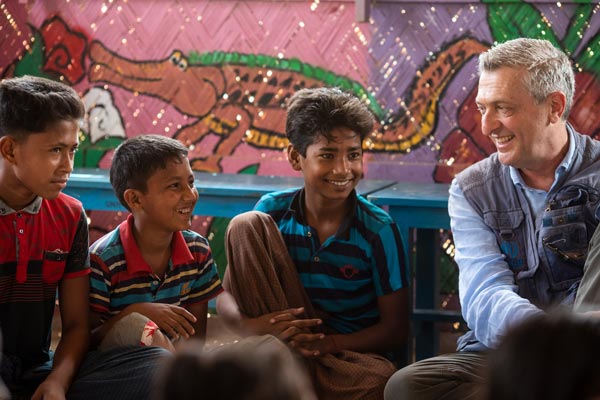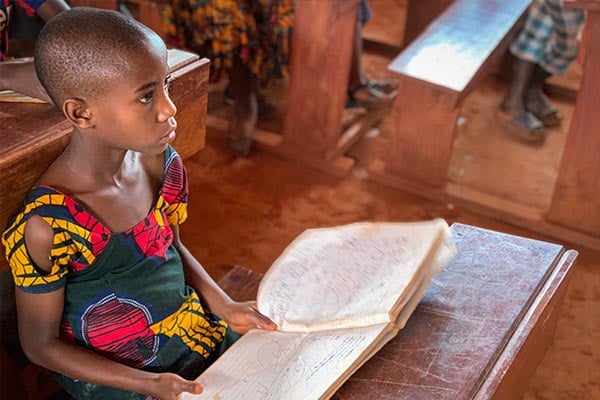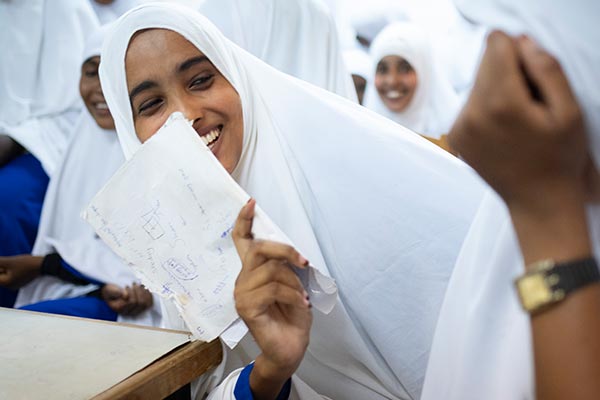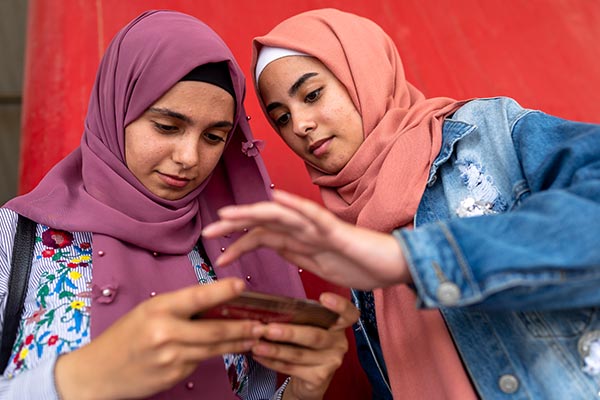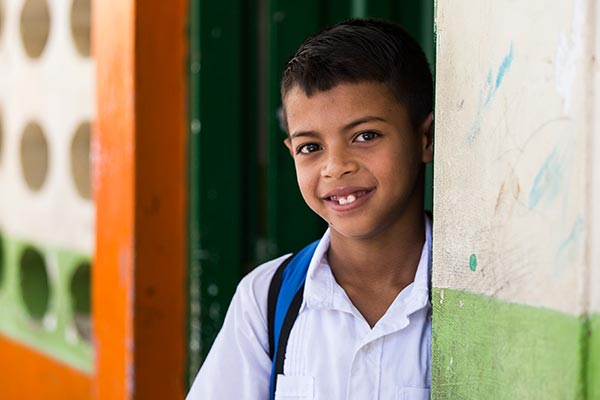FINAL WORD
by Gordon Brown, UN Special Envoy for Global Education
Gordon Brown, the former British prime minister and UN special envoy for global education, visits a public school in Beirut, Lebanon, that runs a double-shift system for Syrian refugees. © Theirworld
For Shehana and her family, education is in the blood.
Before the violence against the Rohingya drove them from their home, Shehana’s father taught at a school in Myanmar’s Rakhine state. One of her older sisters now teaches pre-primary children in the vast Kutupalong refugee settlement, in the far south of Bangladesh. Shehana, now 16 years old, dreams of continuing this family tradition.
But without a proper school, without formal examinations or any hope of gaining recognized qualifications, her chances look bleak. Shehana and a few other teenagers do their determined best in one of Kutupalong’s informal learning centres, but the full-time education they enjoyed at home is now only a memory.
And although Shehana is constantly exhorting friends and relatives to ensure their children are studying, for more than 90 per cent of Rohingya refugee children her age, the idea of going to any sort of school, even with some of the learning centres getting through three cohorts of students a day, is little more than a fantasy.
The global refugee population now exceeds 25 million. More than half are under 18. Hundreds of thousands of young refugees are growing up without the prospect of an education – today, of the 7.1 million refugee children of school age, over 50 per cent are denied a place in school.
Yet education’s critical role is not in dispute. We already know it protects, stimulates, nurtures, develops and strengthens the lives of children, adolescents and youth. We already know what is needed to increase access to it worldwide. Not to do everything in our power to give these children an education would be a reprehensible dereliction of duty.
In the world’s wealthiest countries, it is taken for granted that almost every single child will have access to primary and secondary school. The passionate debates we have about the nature and quality of our schools only underline the importance we attach to education.
Imagine the outcry, then, if the rate of primary school-age children enrolled in school in one of those high-income countries was not 91 per cent, the global level, but less than two-thirds. Or that the rate for secondary school-age children was not 84 per cent, as it is worldwide – or more than 98 per cent, as it is in the wealthiest nations – but was instead 24 per cent.
Yet this is the predicament of the world’s refugee population. Denied a full education, with access particularly poor at secondary level, refugees have no hope of attaining university or learning high-level vocational skills and knowledge.
It is shocking, but hardly surprising, that the enrolment rates among refugees for higher education, are so poor – just 3 per cent for refugee youth, compared to 37 per cent globally and more than three-quarters in high-income countries. And that deprives entire countries, many wracked by years of conflict, of generations of leaders, planners, thinkers and doers.
This is not a problem in far-off lands that rich countries can ignore. It is on our doorsteps, with refugee children – many of them unaccompanied or separated from their families – penned in behind fences in detention centres run by governments that in their next breath would claim to honour their international commitments and abide by humanitarian values and principles.
Almost 70 years ago, the international community signed up to the 1951 Refugee Convention as a response to the post-war European refugee crisis. The compassion shown to Europe’s refugees then is barely afforded them now. Those who risk their lives attempting the journey to Europe today face indifference at best, open hostility at worst. At the same time, countries who do look after refugees have been left to shoulder the burden by their supposed European partners.
Yet no one watching and reading the stories in UNHCR’s annual education report could honestly doubt the desire of these youngsters to see their studies through a full educational cycle. We must not be satisfied with merely helping them to survive the ordeal of displacement; we must give them the tools to thrive, to be independent, self-sufficient and fulfilled individuals.
The time has come for decisive, game-changing measures to end this neglect. That is why I am supporting UNHCR’s new initiative, the Secondary Youth Education Programme, as an effort to rally the international community to this cause. If we are to give millions of children, refugees and non-refugees alike, the chance of an education and the opportunity to unlock their potential, innovative financing projects such this programme, combining the know-how and firepower of the public and private sectors, will play a decisive role.
Breaking down the barriers to secondary school will benefit not just refugees but millions of other children who live side by side with them in low and middle-income countries. Building schools, training teachers, developing innovative ways to help children catch up on missed lessons – these are projects made to last, endeavours that leave legacies of which we could be proud.
The world has another decade to meet the 17 Sustainable Development Goals, including SDG 4 – the commitment to an inclusive and equitable quality education and lifelong learning opportunities for all. But if we do not ensure that all refugee children have access to school, that goal will never be reached.
Shehana and her classmates have no formal curriculum to follow, no desks to write at and no chairs to sit on. But their burning curiosity and appetite for learning remain undimmed. They have been neglected for too long. We owe it to them to sweep away the barriers to education and support them as they forge their own futures.

